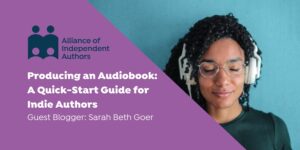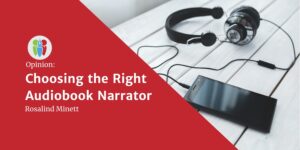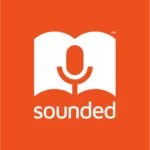In the world of publishing, the popularity of audiobook platforms and the convenience of listening on the go has made audiobooks a compelling format for indie authors seeking new ways to connect with readers.

Jason Kelly, Sounded.com
From traditional studio recordings to “synthetic narration” or “digital replicas”, authors looking to produce an audiobook today will find lots of new terms being used in the industry. But what does it all mean?
In this Alliance of Independent Authors post, Jason Kelly from new ALLi partner Sounded.com shares his insight into the options available and the new terminology you may discover if you are exploring audiobook production today.
“Studio Recording”
Let's start simple. For many authors, undertaking a traditional studio recording is typically a starting point when considering audiobook production.
A professional studio recording involves hiring a professional narrator to read your book, typically in a recording studio (although some professional narrators do record audiobooks from home studios – see below).
The benefits of recording in this way include collaboration with professional voice actors, sound engineers, and producers to deliver a quality finished audiobook product. This should include clear, consistent sound, and a skilled performance bringing your topic or characters to life.
Time frames for audiobook production using this option can vary, with an average of around 8-12 weeks. Costs also vary and are typically priced on a per finished hour (“PFH”) basis. It’s important in any negotiations to ensure a PFH fee is agreed upfront, as this will mean all post-production work to the finished audio product is included in the price. (So if your book is 8 hours, you will pay on a PFH basis for 8 hours of audio only).
In relation to budget, indie authors should expect fees to range from around GBP2,500 to GBP5,000 or more depending on the project's scope, and can be higher where a famous voice actor is engaged.
 If you are considering taking this route, there’s a lot more information in the ALLi blog to help, such as this post exploring the full process from start to finish, which includes how to work with a freelance audiobook producer: Audiobook Quick-Start Guide for Authors.
If you are considering taking this route, there’s a lot more information in the ALLi blog to help, such as this post exploring the full process from start to finish, which includes how to work with a freelance audiobook producer: Audiobook Quick-Start Guide for Authors.
“Home Studio Recording”
For those who prefer a more hands-on approach, setting up a home studio offers an alternative, particularly if you have a high volume of titles to record.
Organising a home studio recording involves purchasing recording equipment and creating a suitable recording environment at home. While the initial investment in microphones and editing software can be substantial, it can provide long-term savings and offer you complete control over the process.
However, if you consider this approach, remember that it can be time-consuming. So, ensure you find a balance between the time spent on production and other author responsibilities, such as writing and marketing.
If you are considering recording your own narration, Dale L. Roberts, indie author and ALLi advisor, has produced a short video sharing his views on tips, tricks and tech as he looks to set up his own studio, here: Record Your Own Audiobook
“Freelance Narrator”
Hiring a freelance narrator who works remotely from their own set-up is another popular option. Platforms like Amazon’s ACX connect authors with experienced narrators who often have their own recording equipment. This can be a cost-effective solution, as freelance rates are usually lower than those of professional studios.
However, the quality of freelance narrators can vary, and just because their pricing is cheaper, doesn’t mean the finished audio will be suitable.
It is crucial to review audio samples of freelance narrators thoroughly and work with someone you trust. As with all indie-author investments, clear contracts are also advised, to ensure the final product meets expectations. Additionally, negotiating rights and royalties can add complexity to the process.
 However you go about recording your audiobook, if you are working with a narrator, selecting the right voice is a critical choice. Indie author Rosalind Minett shared her views in this ALLi blog post from the archive: Choosing the Right Audiobook Narrator
However you go about recording your audiobook, if you are working with a narrator, selecting the right voice is a critical choice. Indie author Rosalind Minett shared her views in this ALLi blog post from the archive: Choosing the Right Audiobook Narrator
“Text-to-Speech”
The advance of technology solutions in publishing has seen a rise in online platforms for audiobook production, including those offering text-to-speech (TTS) services. Advanced TTS options convert written text into spoken words with impressive accuracy and natural-sounding voices.
Some TTS services offer what is known as a managed service, meaning they take your manuscript from you and typically return your audiobook version to you in around 14 days or so. Other services offer real-time production.
One of the primary benefits of using text-to-speech solutions is its cost-effectiveness. Compared to hiring a professional narrator or setting up a home studio, it can often be significantly cheaper, either on a subscription or pay-per-use price model. This makes it an attractive option for authors working with limited budgets.
Additionally, an audiobook can be produced in a fraction of the time it takes for studio narration, making it ideal for those with tight deadlines.
However, at the time of writing, although TTS can already be a good option for non-fiction works in particular, for some fiction authors, the voice options do not yet match a natural voice. But, as the technology grows at speed, it is worth looking into if you are looking for budget-friendly options.
When considering TTS services, understanding exactly what sort of narration you are investing in is one of the most important things to be aware of. Here are a few of the phrases you’ll hear, and what they mean:
“Synthetic Voice”
“Synthetic voice” or “Synthetic narration” is typically used to describe where the voice used in a text-to-speech recording is not identifiable to a living individual (so a ‘Jane Doe’ or ‘John Doe’).
If you use this route, you may find other books use this same voice which may or may not be an issue for you. It can also have an ‘AI’ quality to it, as it is not directly based on a real human voice. This can be particularly tricky for fiction work.
“Voice Clone”
This term refers to an AI voice that sounds like a real person, quite often a famous person (typically celebrities find their voices ‘cloned’). Some people also use these systems to clone their own voices for narration.
I’d suggest people are wary of platforms offering ‘Voice Clones’, whether of your own voice or of a celebrity, particularly if there is no clear licence in place.
You must be absolutely sure any celebrity has agreed to a voice clone. Using celebrity voices without their permission could lead to legal implications at a later date, so read carefully any terms and conditions first.
You should also not assign your own voice to a third party without first understanding what exactly they will use it for, outside of your use. You don’t want to find your voice has been used for other people’s books without your permission or payment.
You should also consider wider ethical issues: some platforms offer narration using ‘deceased’ celebrity voices. Whether for personal issues or legal/ethical reasons, carefully consider the implications of producing your audiobook using a deceased celebrity voice and what this means for you, as well as your audience.
“Digital Replica”

Photo by Jonathan Farber on Unsplash
This term refers to a licensed model for “AI voices” where platforms work alongside voice artists to create a licensed replica of their voice for use in audiobook narration. Here the voice artist is typically paid a fee or has otherwise agreed to its use.
In my opinion, from my experience at Sounded.com, this is currently the most trusted form of text-to-speech for audiobooks, so long as you identify services with clear agreements with their voice artists and with the relevant licence and ethical models in place to protect you and your copyright.
This process can offer the fast turnaround and lower cost of TTS, and the full agreement and collaboration with a voice artist.
Further key considerations with text-to-speech options
When considering using any online platform for text-to-speech audiobook production, remember, not every platform offering these solutions is the same or has the same ethical standards. Do ensure you undertake your own research carefully to find a trusted partner for your audiobook production.
Note also that in the US, case law currently suggests output from an ‘AI System’ is not afforded copyright protection. So do your research before you spend your money, as it is important to ensure you have copyright of the finished audio product you pay for!
Another challenge to be aware of is that, at the time of writing, not all retail platforms permit TTS-produced audiobooks, so this could limit your reach. Where they are allowed, if platforms don’t label correctly consumers could be put off by not having a clear informed choice regarding the narrator.
Conclusion
With the audiobook market currently growing globally at 25% year on year, having an audiobook title is becoming an important option to consider for any indie author portfolio.
Each production method—professional studio, home setup, freelance narrator, or text-to-speech—has its own advantages and challenges, with technology developing all the time.
If you are considering audiobook recordings, take a closer look at all the options out there to see what’s right for you. And always ensure you understand exactly what’s on offer.
Depending on your budget, time, and technical skills, authors do have options to bring their books to life in audio format. Doing so expands not only your storytelling but also opens up exciting new revenue avenues and possibilities to increase your audience for your next great listen!
More about Jason Kelly
 This article was contributed by Jason Kelly of Sounded.com, an online audiobook store and audiobook production platform designed for use by authors and publishers. Sounded offers a range of audiobook production options including exclusive AutoAudio and TrueVoice technology.
This article was contributed by Jason Kelly of Sounded.com, an online audiobook store and audiobook production platform designed for use by authors and publishers. Sounded offers a range of audiobook production options including exclusive AutoAudio and TrueVoice technology.
Sounded is a member of the UK Publishers Association, the Independent Publishers Guild, the Audio Publishers Association and an ALLi partner member. For more information you can visit: authors.sounded.com
ALLi members can search all our partner details by logging into the membership site and selecting the ‘Approved Partners' tab: ALLi Member Site
Do you have a view on emerging narration options?
 If you’re an ALLi member, head over to the SelfPubConnect forum for support from our experienced community of indie authors, advisors, and our own ALLi team, or share your own experience with the community.
If you’re an ALLi member, head over to the SelfPubConnect forum for support from our experienced community of indie authors, advisors, and our own ALLi team, or share your own experience with the community.
To access the forum, simply create an account (if you haven’t already) to request to join the forum and get going.
Non-members looking for more information can search our extensive archive of blog posts and podcast episodes packed with tips and advice at ALLi's Self-Publishing Advice Centre.




